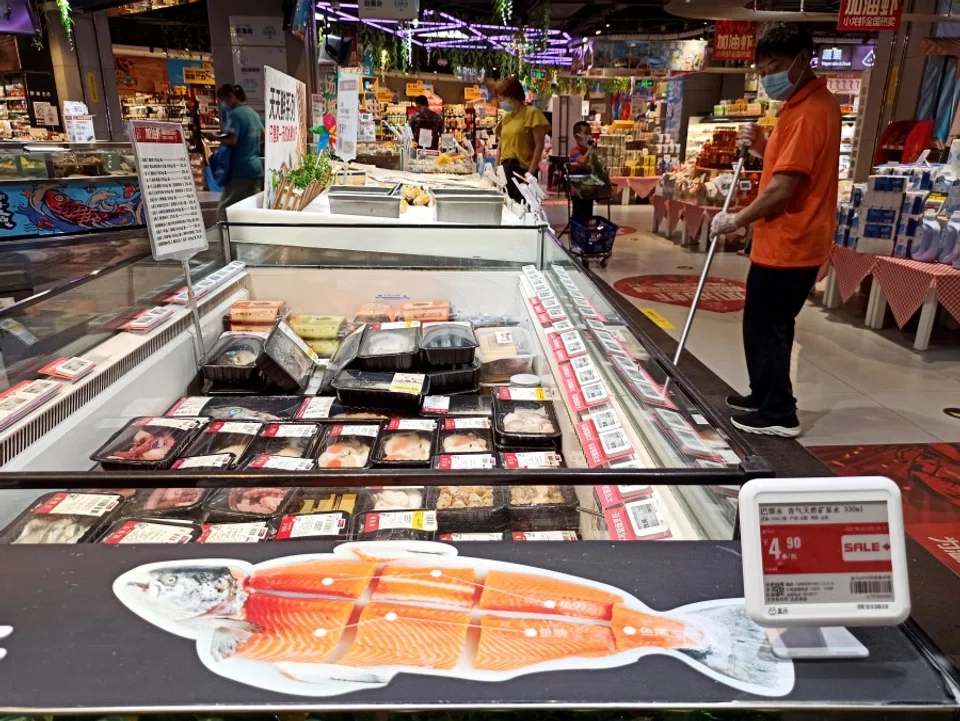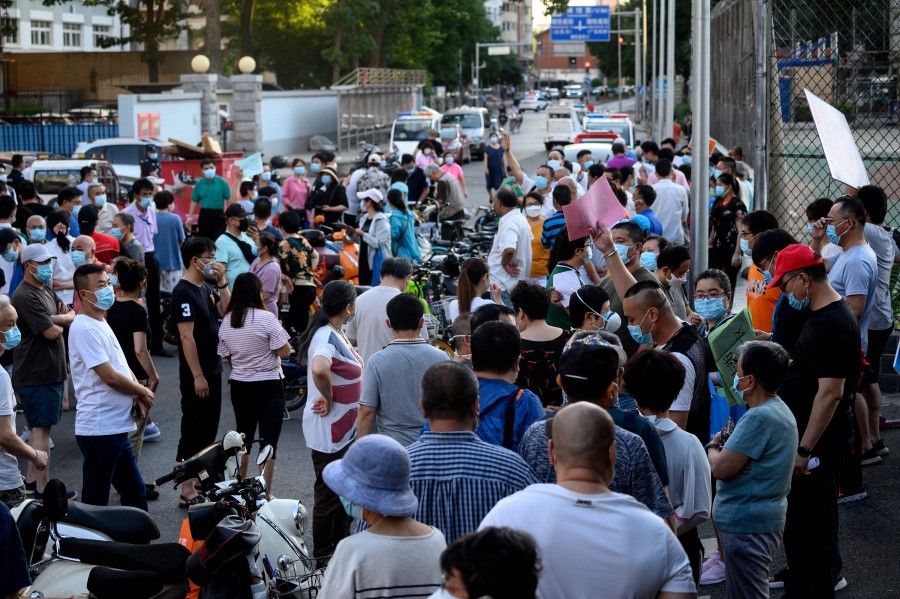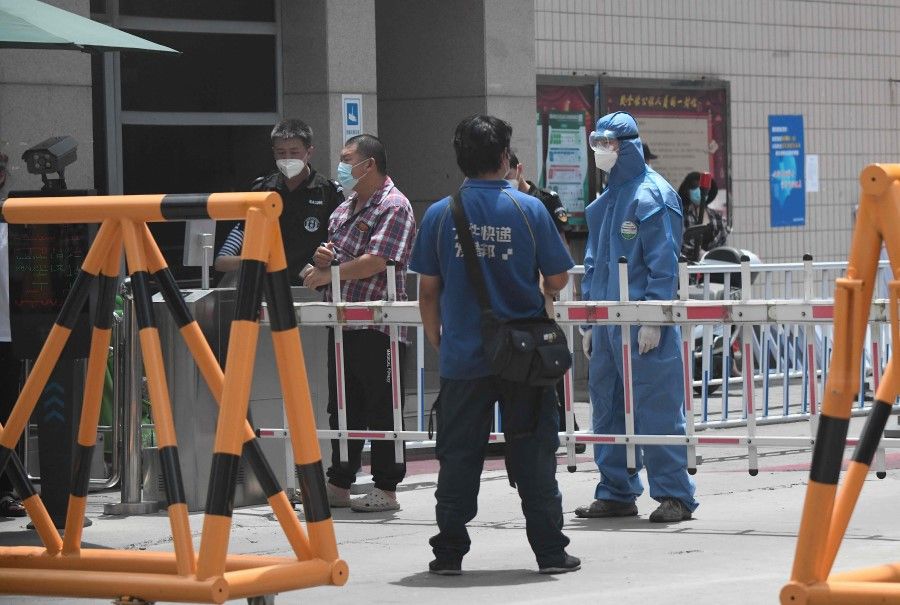Beijing's wholesale market cluster sparks fear of a repeat of Wuhan's ordeal

After 56 days of no new coronavirus cases, Beijing has seen 51 confirmed new local cases in the four days since 11 June, all linked to the Xinfadi wholesale market.
Following investigations, news that the virus was found on a chopping board used by a seller of imported salmon has sparked a frenzy. It was also revealed on we-media that there were confirmed coronavirus cases among workers at a Chilean salmon supplier in March, hinting that infected foreign workers had transmitted the coronavirus to the salmon during capture, processing, and transportation, in turn passing on the virus through the international supply chain.
"Salmon doesn't even have lungs; how could they get pneumonia?" - Chinese netizen
Salmon products were quickly taken off the shelves of stores and supermarkets in Beijing, and soon after, in many other cities. On social media, the internet community was gripped by "fish phobia", while Japanese stores clarified that their salmon was genuine local-produced rainbow trout. The theory of salmon as the "culprit" even spread to Singapore - a colleague's mother told her that elderly housewives were reminding one another not to buy salmon because it could "spread the virus".

However, since yesterday, some people in China have been speaking up in defence of salmon. Some experts say getting contaminated with the coronavirus is different from getting infected by it, and it is extremely unlikely for seafood to be a carrier of coronavirus, and it is almost impossible for a virus to be transmitted to humans via fish. One Chinese netizen put it plainly: "Salmon doesn't even have lungs; how could they get pneumonia?"
...the possibility of a second wave of infection has been looming like the sword of Damocles.
Whether salmon is the culprit or an innocent party in this new wave of coronavirus in Beijing has to be answered by scientists. However, it is understandable that people are concerned. Besides the fact that salmon is a common food, everyone is anxious for an answer now that it is six months into the pandemic, and there is still no clue as to the source of the coronavirus.
The urgent desire to get to the source of the coronavirus and means of transmission has also been magnified by collective fear given the resurgence of local cases. After China's domestic cases were gradually brought under control, local cases have been rare, but the possibility of a second wave of infection has been looming like the sword of Damocles.
Many are surprised and shocked at Beijing's local cluster. Beijing has been strict, and its control measures have been the tightest outside of Hubei; it only lowered its coronavirus emergency response from level two to level three on 6 June. After the coronavirus started spreading outside of China, all international flights into Beijing had to be redirected to other first points of entry; the whole country set up a barrier to prevent imported cases of the coronavirus to Beijing.
When the coronavirus first broke out in Wuhan, the Huanan wholesale market was the most prominent cluster, while the latest cluster in Beijing is also a wholesale market.

But even with the watertight defences, Beijing has "fallen". And even more worryingly, at first glance, this wave shares many similarities with what happened in Wuhan between late 2019 and early January 2020. When the coronavirus first broke out in Wuhan, the Huanan wholesale market was the most prominent cluster, while the latest cluster in Beijing is also a wholesale market. Coincidence or not, people are reminded of the coronavirus in Wuhan.
From official reports over the past couple of days, some confirmed cases showed symptoms such as sneezing, runny nose, fatigue, muscle aches from 4 June, but did not seek treatment. They were only diagnosed on 12 June, when test samples were taken to trace the source of the coronavirus. This also means that by the time the first case was confirmed, the coronavirus could have already spread within or even beyond the Xinfadi market, sparking concerns of a resurgence of the coronavirus in Beijing.
Official media People's Daily released a commentary to reassure the people, claiming that there is no comparison between Beijing which is now well-prepared with Wuhan that knew nothing of the novel coronavirus six months ago, and there is practically no chance of an individual cluster leading to a city-wide outbreak.
Beijing is back in community prevention mode.
With the sudden change in the situation, Beijing has shut down Xinfadi market, and implemented "wartime-like" control measures in Fengtai District where the market is located, and conducted large-scale checks on people who have recently been to Xinfadi market.

Two nights ago, on my way home, after many days of not having my temperature taken, the security staff in my neighbourhood stopped me, requested for my access card, and scrupulously took my temperature. At the elevator, I found a notice from the property management asking residents who had been to Xinfadi market between 30 May and 12 June to contact them. And as I was writing this article, the property management phoned me to ask if I had been to the market.
In these extraordinary circumstances, clearly Beijing is back in community prevention mode. Having gone through one wave of the coronavirus, China has gained a lot of experience in testing capabilities, tracking and tracing, and prevention. Whether it can prevent a second wave of the coronavirus will be another challenge for the authorities. Hopefully, concerns that the Wuhan scenario will be repeated in Beijing are not valid.
Editor's note:
A Bejing Daily report said that Zhou Yuqing, deputy head of Fengtai District, has been removed from the post for "failing" in his duty in Covid-19 prevention and control work, while Wang Hua, the Party Secretary of Huaxiang Town in Fengtai District, and Zhang Yuelin, general manager of the Xinfadi market, were also removed from their posts.
